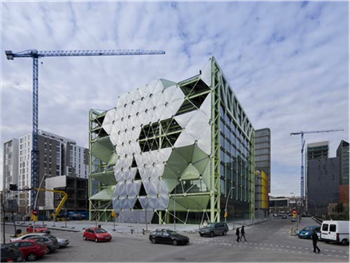
The Barcelona waterfront was once an industrial area, but now offers beaches, restaurants, and harbors.
In early June, I spent an incredible few days in Barcelona, Spain as a member of a delegation of government officials, policy advocates, researchers, and civic leaders invited by the Brookings Institution and hosted by ESADE. In a setting steeped in beauty and rich in innovation, our task was to explore emerging strategies for delivering the "next economy." We were fortunate to hear from some of the best economic minds in Spain and the European Union. I was struck by Chicago and Barcelona's many similarities, including that both are experiencing historic, and orderly, mayoral transitions. I also discovered that the capital of the Mediterranean has much to teach the capital of the Midwest about what it will take to secure our economic future. While these insights are fresh in my mind, I want to share four takeaways:
Clear intentions yield the greatest impact. In the midst of wrenching economic restructuring across the globe, Barcelona has mapped a path for more entrepreneurs to succeed, new sectors to flourish, and multiple bureaucratic roadblocks to be removed. During our visit, Deputy Mayor Jordi Carnes explained that once the EU understood it had excess auto manufacturing capacity, instead of holding on to the past, Barcelona re-tooled for other production. The city's food packaging and chemical sectors are also intentionally restructuring, driven by the private sector, but supported by government and research institutions. Metropolitan Chicago lacks a sector-specific action plan to attract high-growth businesses, and without clear intentions, we run the risk of diluting our impact in the global market.
A bit of attitude is appropriate. Barcelona—not just the city, but the entire metropolitan region of Catalonia, now re-branded as the Barcelona Triangle—has cataloged it strengths. The region knows its selling points: industrial might, access to capital and talent, and a launch pad to sell to the world. And they're not bashful when it comes to promotion! Everywhere we turned, there were impressive brochures and easily navigable websites the welcomed entrepreneurs and investors. Successfully implementing the Chicago Metropolitan Agency for Planning's GO TO 2040 plan necessitates buy-in around metropolitan Chicago's top business attractors. Reminding the world what this region is good at will go a long way toward positioning ourselves for future economic growth.

22@Barcelona is a former industrial area transformed into a space for innovative small and mid-size media and information businesses.
All incentives are not created equal. To attract knowledge-based industries, which thrive in a vibrant, mixed-use setting, Barcelona is using land use incentives, specifically density bonuses, along with targeted financing. Tax breaks are almost unheard of. In the U.S., we don't often link land use incentives to sector-specific growth strategies, and we're far too quick on the trigger to hand out tax breaks. In Barcelona, we got to see the difference up close in the building pictured here that is incubating dozens of media and entertainment companies. The benefits of co-location and a government willing to remove obstacles to their growth attracts such small and mid-sized companies, not hand-outs.
"Us versus them" brings us all down. The Barcelona Economic Triangle (which encompasses Barcelona and Catalonia) evokes the tri-state Chicago metropolitan area, with one important difference: There they've overcome the economic development mindset of "I win, you lose." The City of Barcelona helps fund and govern a suburban research park, and the region invests heavily in the city's infrastructure and livability. In the Chicago region, we still struggle with a "gotcha game" mentality, which leads to idiocy like three separate transit systems that don't share a fare medium or coordinate stops and schedules. Hands down, it was easier—in another language—to navigate purchasing a ticket and traveling via train from Madrid to Barcelona than traveling from my neighborhood on Chicago's north side to northwestern Indiana. The new economy pays little attention to governmental boundaries, which is why I'm encouraged that both Chicago's Mayor Emanuel and Indiana's Governor Daniels recently have expressed interest in capitalizing on the intermodal assets that lie on both sides of our shared state line.
With the assistance of my colleagues at MPC, the experts at Brookings, and and our civic and government partners, I'm hoping to translate some of what I learned in Spain about investing in research and development, building on our strengths, and brokering win-wins. There are numerous near-term opportunities in our high-potential region.
I'm also looking forward to learning even more about the new economy from the Metropolitan Policy Program at Brookings' upcoming webcast, "Sizing the Clean Economy: A National and Regional Green Jobs Assessment," on Wednesday, July 13, at 8 a.m. CST. That day, Brookings is releasing a major new report on the growth of the clean economy in the United States. Business, economic development, and political leaders will provide an overview of progress made by clean industries, identify policy opportunities, and discuss how the nation, states and regions can facilitate faster growth of the clean economy. I'll be tuning in, and I hope you'll join me.